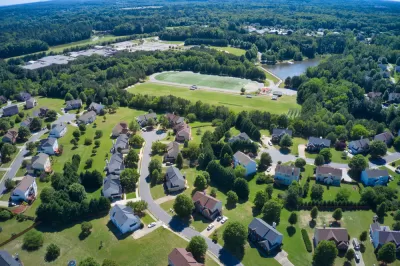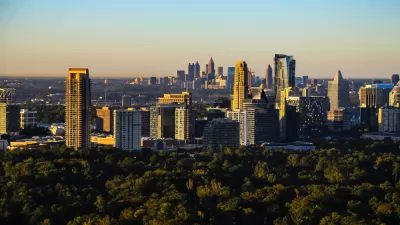After local activists whipped up concerns about forced density to promote cityhood for three wealthy Atlanta suburbs, residents voted to remain in unincorporated Cobb County.

“Voters defeated ballot referendums for three unincorporated areas that were hoping to turn into the newest cities of Cobb County, just west of Atlanta,” reports Brentin Mock in Bloomberg CityLab.
The communities of East Cobb, Los Mountain, and Vinings started agitating for cityhood after Cobb County proposed zoning reforms that, as interpreted by some, would allow for increased density and mass transit in the historically single-family neighborhoods. “Only through creating their own cities, said cityhood proponents, could they control land use to stop these developments.” The secession of three of the county’s wealthiest areas would have a significant impact on local tax revenue. “A preliminary study said that the formation of the three cities would have had a net annual impact of roughly $33 million on the county’s budget, which would have forced the county to lay off dozens of police, firefighters, and other government administrators.”
As Mock writes, “In reality, those concerns were mostly unfounded: As the Atlanta Journal-Constitution reported, the Cobb County Board of Commissioners — the governing authority for the county — had introduced no plans to add density to these areas.”
Voters didn’t buy into the hysteria. “Just over half of voters, 55%, in the Vinings ballot referendum voted against the cityhood proposal (only those who live within the proposed city boundaries can vote on cityhood referendums); 57% voted against the Lost Mountain proposal and 72% rejected East Cobb cityhood.”
Buckhead, a neighborhood in the city of Atlanta, also attempted to put secession on the ballot for November 2022, but those efforts were thwarted by state leaders.
FULL STORY: The Cityhood Movement Is Defeated in Metro Atlanta

Alabama: Trump Terminates Settlements for Black Communities Harmed By Raw Sewage
Trump deemed the landmark civil rights agreement “illegal DEI and environmental justice policy.”

Study: Maui’s Plan to Convert Vacation Rentals to Long-Term Housing Could Cause Nearly $1 Billion Economic Loss
The plan would reduce visitor accommodation by 25% resulting in 1,900 jobs lost.

Planetizen Federal Action Tracker
A weekly monitor of how Trump’s orders and actions are impacting planners and planning in America.

Waymo Gets Permission to Map SF’s Market Street
If allowed to operate on the traffic-restricted street, Waymo’s autonomous taxis would have a leg up over ride-hailing competitors — and counter the city’s efforts to grow bike and pedestrian on the thoroughfare.

Parklet Symposium Highlights the Success of Shared Spaces
Parklets got a boost during the Covid-19 pandemic, when the concept was translated to outdoor dining programs that offered restaurants a lifeline during the shutdown.

Federal Homelessness Agency Places Entire Staff on Leave
The U.S. Interagency Council on Homelessness is the only federal agency dedicated to preventing and ending homelessness.
Urban Design for Planners 1: Software Tools
This six-course series explores essential urban design concepts using open source software and equips planners with the tools they need to participate fully in the urban design process.
Planning for Universal Design
Learn the tools for implementing Universal Design in planning regulations.
Caltrans
Smith Gee Studio
Institute for Housing and Urban Development Studies (IHS)
City of Grandview
Harvard GSD Executive Education
Toledo-Lucas County Plan Commissions
Salt Lake City
NYU Wagner Graduate School of Public Service





























